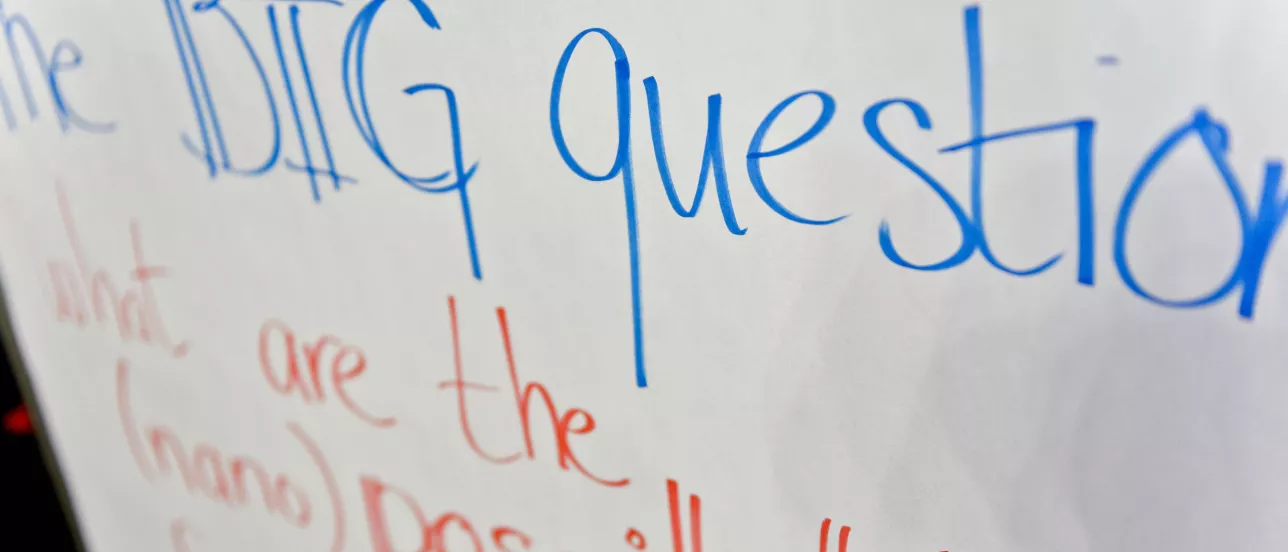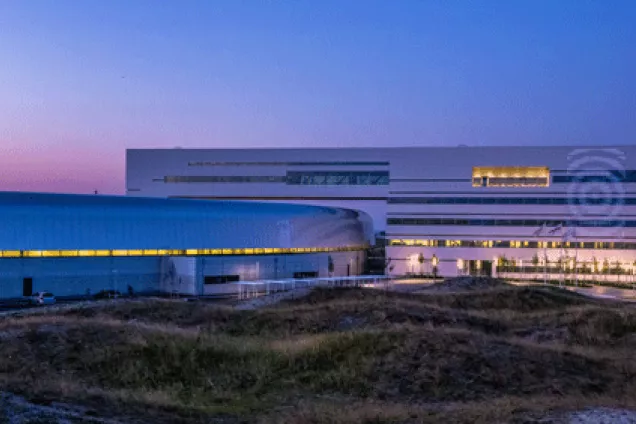Physics, Experimental Particle and Nuclear Physics - Master Programme
Master's programme · 2 years · 120 credits

Description
Are you fascinated by the fundamental principles of our world: the smallest constituents of matter and what forces act on them? This Master programme enables you to take part in the hunt for new knowledge via international experiments such as those at CERN and FAIR.
In this Master programme, you will gain an understanding of the fundamental principles that govern the structure of the entire physical world, through the mathematical theories and experimental data that reveal the physics of the known universe. Among other things, the Master programme will provide you with specialised knowledge of the standard model of physics, including its fundamental potential to explain the basic principles of physics, as well as its limitations. You will gain insight into the research that strives for explanations outside the framework of the standard model, for example with regard to the universe’s dark matter. You can also learn about the quantum mechanical nature of the nuclei: from studies of its many different structures to the search for new super-heavy elements. And even what happens when it melts into a quark-gluon plasma, the extremely energy-dense matter which characterised the early universe.
The programme offers a wide variety of master projects that cover everything from carrying out experiments and data analysis, to e-science and hardware development and testing. We are involved in the ATLAS and ALICE experiments at the LHC at CERN and their upgrades. Dark Matter is the majority of the matter in the Universe, but what is it made of? The LDMX experiment is being prepared to answer that question. The HIBEAM/NNBAR collaboration is a planned international programme of searches for neutron conversions between matter and antimatter at ESS. Research on the stability and structure of atomic nuclei is conducted within the international FAIR-NUSTAR and CERN-ISOLDE collaborations, but also at other facilities in Europe and the USA. In applied nuclear physics, we study anthropogenic radioactivity in the environment.
Programme structure
The programme includes two compulsory courses, one in quantum mechanics and one on quantum physics in research and society. During your first year of study, you will also choose between a number of other courses, for example in experimental tools, modern experimental particle physics or advanced nuclear physics.
During your second year of study, you will continue to build your expertise on the basis of your personal preferences. For example, you can take a course on theoretical particle physics. Your degree project will be equivalent to either 30 or 60 credits and will be done in a research group. During the degree project work, you have the opportunity to be an active member of an international research team and, in certain cases, to visit the experiments or take part in workshops and meetings.
Career prospects
The Master programme provides a good basis for research studies in particle and nuclear physics and prepares you to work in the major international research laboratories. Both the research facilities in Lund – the MAX IV Laboratory and ESS (European Spallation Source) – and those around the world.
A master’s degree in particle and nuclear physics also prepares you well for a career path outside of academia; many graduates go on to jobs in fields such as information and communications technology, or e-science, where there is a need for expertise in advanced programming and modelling as well as the processing of large amounts of data.
Computers in the programme
The programme requires that you have access to a computer, preferably a laptop, on which you can install software mainly provided by the University, such as Microsoft 365, CAD/CAM and development environments for Python, Matlab or other computational tools. It can be either a Windows computer or a MacOS. On some courses you may need to buy or rent your own software.
Conditions in the study environment and during study visits and field studies
The programme contains compulsory elements that require you to be able to work independently and safely in a laboratory environment, in a hospital environment, in workshops, in production facilities, or during study visits and field studies. These elements require the ability to comply with safety regulations and instructions, and to move around in and evacuate premises safely. The elements also require the ability to monitor and control the processes studied.
Closed for applications
Application opportunitiesClosed for applications
Learn more about our application periods and when to apply for studies at Lund University.
Contact
Programme coordinator
Peter Christiansen
Email: peter [dot] christiansen [at] fysik [dot] lu [dot] se
Study advisor
Johanna Nilsson Onsberg
Email: studievagledning [at] fysik [dot] lu [dot] se
Requirements and selection
Entry requirements
Bachelor’s degree of at least 180 credits in physics or the equivalent. The degree must include at least 90 credits in physics.
Proficiency in English equivalent to English 6/B from Swedish upper-secondary school.
Selection criteria
English language requirements
Most of Lund University’s programmes require English Level 6 (unless otherwise stated under 'Entry requirements'). This is the equivalent of an overall IELTS score of 6.5 or a TOEFL score of 90. There are several ways to prove your English language proficiency – check which proof is accepted at the University Admissions in Sweden website. All students must prove they meet English language requirements by the document deadline, in order to be considered for admission.
How to prove your English proficiency – universityadmissions.se
Country-specific requirements
Check if there are any country-specific eligibility rules for you to study Bachelor's or Master's studies in Sweden:
Country-specific requirements for Bachelor's studies – universityadmissions.se
Country-specific requirements for Master's studies – universityadmissions.se
Apply
Start Autumn Semester 2025
Day-time Lund, full time 100%
In English
Study period
1 September 2025 - 6 June 2027
Application
Closed for applications
How to apply
Lund University uses a national application system run by University Admissions in Sweden. It is only possible to apply during the application periods.
Step 1: Apply online
- Check that you meet the entry requirements of the programme or course you are interested in (refer to the section above on this webpage).
- Start your application – go to the University Admissions in Sweden website where you create an account and select programmes/courses during the application period.
Visit the University Admissions in Sweden website - Rank your programme/course choices in order of preference and submit them before the application deadline.
Step 2: Submit documents
- Read about how to document your eligibility and how to submit your documents at the University Admissions in Sweden website. Follow any country-specific document rules for Master's studies or Bachelor's studies
Country-specific requirements for Bachelor's studies – universityadmissions.se
Country-specific requirements for Master's studies – universityadmissions.se
- Get all your documents ready:
- official transcripts and high school diploma (Bachelor's applicants)
- official transcripts and degree certificate or proof that you are in the final year of your Bachelor's (Master's applicants)
- passport/ID (all applicants) and
- proof of English proficiency (all applicants).
- Prepare programme-specific documents if stated in the next paragraph on this webpage.
- Upload or send all required documents to University Admissions before the document deadline.
- Pay the application fee (if applicable – refer to the section below on this webpage) before the document deadline.
* Note that the process is different if you are applying as an exchange student or as a part of a cooperation programme (such as Erasmus+).
* If you have studied your entire Bachelor's programme in Sweden and all of your academic credits are in Ladok, you do not have to submit transcripts or your diploma when applying for a Master's programme. However, there may still be other documents you need to submit! See the link below.
* Svensk student?
Läs instruktionerna om att söka till ett internationellt masterprogram på lu.se
Programme-specific documents
In addition to the documents mentioned under Step 2, you must also submit a 'Summary Sheet' when you apply for this programme.
Summary Sheet for the Master's programmes in Physics (PDF, new window)
Tuition fees
Non-EU/EEA citizens
Full programme/course tuition fee: SEK 340 000
First payment: SEK 85 000
Citizens of a country outside of the European Union (EU), the European Economic Area (EEA) and Switzerland are required to pay tuition fees. You pay one instalment of the tuition fee in advance of each semester.
Tuition fees, payments and exemptions
EU/EEA citizens and Switzerland
There are no tuition fees for citizens of the European Union (EU), the European Economic Area (EEA) and Switzerland.
Application fee
If you are required to pay tuition fees, you are generally also required to pay an application fee of SEK 900 when you apply at the University Admissions in Sweden website. You pay one application fee regardless of how many programmes or courses you apply to.
- Paying your application fee – universityadmissions.se
- Exemptions from paying the application fee – universityadmissions.se
- Convert currency – xe.com
*Note that there are no tuition or application fees for exchange students or doctoral/PhD students, regardless of their nationality.
Scholarships & funding
Lund University Global Scholarship programme
The Lund University Global Scholarship programme is a merit-based and selective scholarship targeted at top academic students from countries outside the EU/EEA.
Lund University Global Scholarship
Within the framework of the Lund University Global Scholarship programme, the University also offers the African Research Universities Alliance (ARUA) Scholarship targeted at top academic students from selected African research universities.
Swedish Institute Scholarships
The Swedish Institute offers scholarships to international students applying for studies in Sweden at Master's level.
Scholarship information on the Swedish Institute website
Country-specific scholarships and funding options
Lund University has agreements with scholarship organisations and funding bodies in different countries, which may allow applicants to apply for funding or scholarships in their home countries for their studies at Lund University.
External scholarships
More information and testimonials about this Master's

"All the facilities you could possibly need are here"
Patrawan from Thailand

MAX IV and ESS – our world-class research facilities
Learn more at maxiv.lu.se